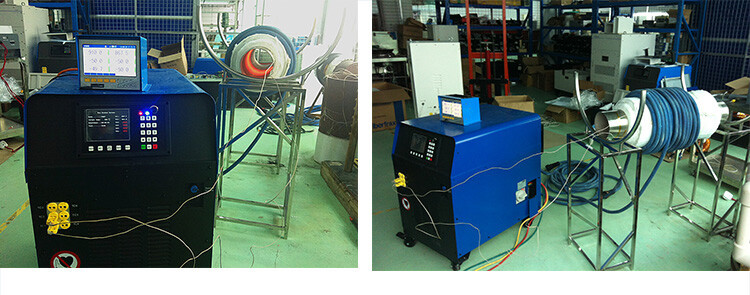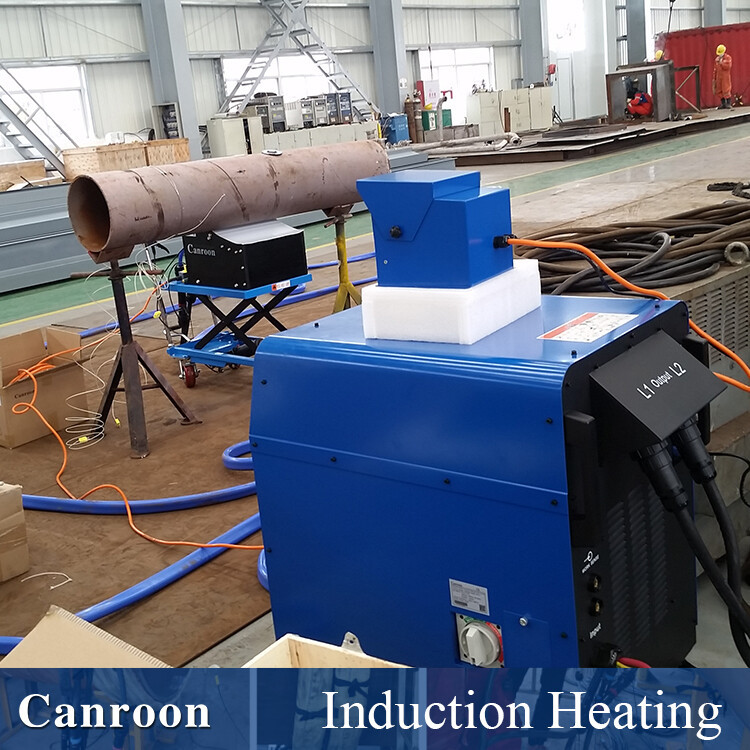
News
You are witnessing a revolution in industrial heating processes, driven by the remarkable capabilities of 60Hz induction heating machines. These systems achieve efficiency levels exceeding 90%, reducing energy waste by over 35%. The global market for induction heating technology is projected to grow from $10.33 billion in 2024 to $17.61 billion by 2034. Such advancements not only enhance energy efficiency but also pave the way for safer and greener operations. With innovations like multifunctional induction heaters, this technology is transforming industries worldwide.
Key Takeaways
60Hz induction heaters work with over 90% efficiency. This cuts energy waste and lowers costs.
Adding IoT and AI helps monitor machines in real-time. It also predicts problems early, improving performance and saving time.
Modular designs make these systems easy to expand. This helps industries adjust to new production needs quickly.

Advancements in Power Electronics
Semiconductor Innovations with SiC and GaN
The rise of silicon carbide (SiC) and gallium nitride (GaN) semiconductors is revolutionizing the performance of 60Hz induction heating machines. These materials enhance energy efficiency by reducing energy loss during the heating process. Modern systems now achieve efficiency levels exceeding 90%, cutting energy waste by over 35%. SiC and GaN also improve durability, ensuring reliable operation in demanding industrial environments.High-Frequency Inverters
These advancements make industrial induction heating systems more sustainable and cost-effective, paving the way for widespread adoption across industries.
High-Frequency Inverters in 60Hz Induction Heating Machines
High-frequency inverters are transforming induction heating technology. They generate magnetic fields that induce eddy currents in metal objects, enabling rapid and uniform heating. This innovation reduces energy consumption and shortens production times.
High-frequency inverters generate efficient heating through high-frequency magnetic fields.
They create eddy currents in metal objects, leading to rapid and even heating.
This technology results in reduced energy consumption and shorter production times.
By optimizing power converters and coil designs, these systems minimize ambient heat loss, allowing for faster temperature increases and improved control over the heating process.
Thermal Management for Enhanced Efficiency
Advanced thermal management plays a critical role in maintaining the efficiency of 60Hz induction heating machines. Innovative cooling systems prevent overheating, ensuring consistent operation and extending the lifespan of the equipment. These systems dissipate heat effectively, which is crucial for high-demand industrial applications.
The optimal design of power converters and coils further enhances efficiency by minimizing ambient heat loss. This allows the system to reach high temperatures quickly, reducing energy consumption and improving overall performance. With these advancements, you can rely on induction heating systems to deliver consistent results while maintaining energy efficiency.
Integration of Industry 4.0 Technologies
IoT Applications in Induction Heating Processes
The Internet of Things (IoT) is revolutionizing how you monitor and manage industrial induction heating systems. By embedding sensors and connectivity into these machines, IoT enables real-time data collection and analysis. This allows you to track critical parameters like temperature, energy consumption, and power levels with precision.
IoT applications enhance operational efficiency by providing real-time monitoring.
They enable seamless communication between devices, ensuring smooth process control.
Data-driven insights help you optimize energy usage and reduce waste.
Profiling techniques in IoT deployments have shown remarkable success in industrial heat treatment. These methods ensure compliance with quality standards by detecting variations during rapid process changes. Data collected is transmitted to a PLC, which monitors power and operational parameters effectively.
With IoT, you gain better visibility into your processes, leading to improved efficiency and reduced downtime.
AI-Driven Optimization for Performance Enhancement
Artificial intelligence (AI) is taking induction heating technology to the next level. Advanced AI algorithms analyze data in real time, enabling adaptive control of the heating process. This ensures optimal energy usage and consistent product quality.
AI-driven systems monitor and adjust parameters dynamically.
They reduce energy consumption by fine-tuning the heating process.
These systems improve product quality by maintaining precise temperature control.
The integration of AI in 60Hz induction heating machines enhances energy efficiency and minimizes operational errors. You can rely on these intelligent systems to deliver superior performance while reducing costs.
Predictive Maintenance in 60Hz Induction Heating Machines
Predictive maintenance, powered by IoT and AI, is transforming how you maintain industrial induction heating systems. By analyzing data from sensors, these technologies predict potential failures before they occur. This proactive approach minimizes downtime and extends equipment lifespan.
Predictive maintenance reduces unplanned outages by identifying issues early.
It lowers maintenance costs by addressing problems before they escalate.
This approach ensures consistent performance and reliability.
The combination of IoT and AI in predictive maintenance creates a more sustainable and efficient system. You can focus on maximizing productivity without worrying about unexpected breakdowns.

Energy Efficiency and Sustainability
Energy-Efficient Induction Heating Systems
Energy-efficient systems are transforming industrial induction heating. These systems reduce energy consumption by optimizing the heating process. Modern 60Hz induction heating machines achieve over 90% efficiency, minimizing waste and lowering operational costs. By focusing on precise temperature control, these systems ensure consistent results while conserving energy.
You can also benefit from advanced designs that integrate heating and cooling systems. These designs maintain stable temperatures, reducing energy loss during transitions. With these innovations, industrial induction heating becomes a cornerstone of sustainable systems, offering significant energy savings and improved performance.
Renewable Energy Integration in Heating Technology
The integration of renewable energies into heating technology is reshaping industrial processes. Solar and wind energy now power many induction heating systems, reducing reliance on fossil fuels. This shift supports zero-emission buildings and promotes sustainability across industries.
Energy storage solutions further enhance this integration. By storing renewable energy, you can operate heating systems even during low production periods. This approach ensures uninterrupted operations while maintaining environmental responsibility. Renewable energy integration not only reduces costs but also aligns with global sustainability goals.
Carbon Footprint Reduction in Industrial Processes
Modern induction heating systems play a vital role in reducing carbon footprints. By replacing traditional methods with energy-efficient alternatives, you can significantly cut emissions. For example, batch integral quench processes reduce carbon emissions by 73 tons per year, while batch carburizing achieves a reduction of 52 tons annually.
These advancements contribute to sustainable systems and support industries in meeting environmental standards. By adopting these technologies, you help create a cleaner, greener future.
Customization and Flexibility
Industry-Specific Applications of 60Hz Induction Heating Machines
Industries today demand solutions tailored to their unique processes and materials. A 60Hz induction heating machine offers unmatched versatility, making it suitable for diverse applications. Rolling mills rely on these systems to deliver uniformly heated steel, ensuring continuous production and cost efficiency. In metalworking, induction heating supports melting and casting for automotive parts, turbine blades, and even jewelry. Aerospace manufacturers benefit from precise heating for high-quality components, while the food and beverage sector uses this technology for cooking and processing.
Tailored applications improve product quality by addressing specific material requirements. Advanced control systems allow you to customize heating parameters, ensuring consistent results. This flexibility enhances efficiency and reduces waste, making it a valuable asset across industries.
Modular Designs for Scalable Solutions
Modular designs in industrial induction heating systems provide scalability to meet changing production demands. These systems allow you to add or remove modules as needed, minimizing downtime and maximizing efficiency. For example, frequency-synchronized resonant converters and variable frequency inverters improve energy use and system performance.
These modular designs not only support growing production needs but also reduce energy consumption, leading to significant savings.
Tailored Systems for Unique Operational Needs
Tailored systems address the specific challenges of your operations. Faster heating and precise temperature control improve process efficiency, while controlled heating ensures consistent product quality. Direct heat delivery reduces energy waste, lowering operating costs.
Whether you work in aerospace, automotive, or food processing, a customized induction heating system can meet your unique needs. These systems adapt to your requirements, ensuring optimal performance and energy savings.
Enhanced Process Automation
Robotics in Induction Heating Processes
Robotics is revolutionizing induction heating processes by delivering unmatched precision and efficiency. Robots ensure consistent and repeatable operations, especially in brazing and welding applications. Controlled heat application improves joint quality while reducing defects. Sensors and feedback mechanisms further enhance process control, adapting to real-time changes for optimal results.
You can also achieve significant cost savings with robotics. Precision minimizes material waste, contributing to lower operational costs and improved sustainability. Additionally, robots simplify complex tasks, reducing manual intervention and improving overall productivity.
Automated Quality Control in Heating Technology
Automated quality control systems play a vital role in maintaining high standards in induction heating technology. These systems use intelligent control mechanisms to provide real-time monitoring and feedback. Profiling techniques determine penetration depth and hardness, while statistical process control ensures process stability over time.
By integrating these systems, you can detect surface cracks and other defects early, improving product quality. Automated quality control also reduces manual inspection efforts, saving time and resources. With real-time monitoring, you can adapt to changes instantly, ensuring precise control and consistent results.
Smart Workflows for Industrial Efficiency
Smart workflows streamline industrial processes, making them more efficient and reliable. Automated induction heating systems integrate seamlessly into production lines, reducing manual intervention. These systems coordinate tasks, minimize delays, and ensure every step runs smoothly.
You can also benefit from improved energy efficiency with smart workflows. By optimizing task coordination, these systems reduce energy waste and enhance productivity. Profiling techniques, commonly used in heat treatment applications, further improve process quality. Whether in manufacturing or maintenance, smart workflows simplify operations and boost overall performance.
Smart workflow automation simplifies complex industrial processes.
Automated systems optimize workflows by coordinating tasks and minimizing delays.
Profiling techniques improve process quality and contribute to sustainability.
The trends shaping 60Hz induction heating technology in 2025 highlight its transformative potential. You’ve seen advancements in power electronics, Industry 4.0 integration, and energy efficiency. These innovations improve sustainability and reduce costs across industries.
The future of 60Hz induction heating lies in smarter, greener, and more adaptable systems. By adopting these technologies, you can drive industrial efficiency and environmental responsibility forward.
Stay ahead by embracing these cutting-edge solutions.
FAQ
What industries benefit the most from 60Hz induction heating technology?
Industries like automotive, aerospace, metalworking, and food processing benefit greatly. These systems offer precise heating, energy efficiency, and tailored solutions for diverse applications.
How does 60Hz induction heating improve energy efficiency?
It minimizes energy waste by achieving over 90% efficiency. Advanced designs optimize heating and cooling processes, reducing operational costs and environmental impact.
Can 60Hz induction heating systems integrate with renewable energy?
Yes, they can. Many systems now use solar or wind energy, supported by energy storage solutions. This integration promotes sustainability and reduces reliance on fossil fuels.
Tip: Explore renewable energy options for your heating systems to align with global sustainability goals.
Please give us a message